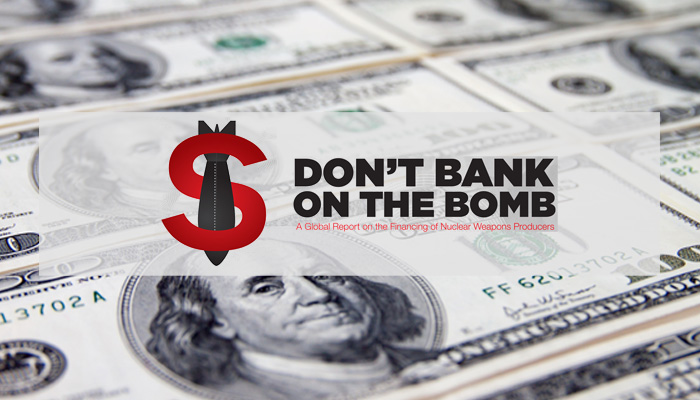53 financial institutions prohibit or limit investments in nuclear weapon producers, shows Don’t Bank on the Bomb, a report published today by PAX. This is a 150% increase compared to last year’s report. The increase illustrates the growing stigmatization of nuclear weapons because of the renewed focus on their humanitarian consequences.
The report also identifies 382 banks, insurance companies and pension funds which have made USD 493 billion available to nuclear weapons producers since January 2012. Based on evidence presented in the report, activists worldwide call on financial institutions to stop any investments into weapons of mass destruction, and on governments to ban nuclear weapons once and for all.
The PAX report shows how these stigmatizing policies result in new exclusions by a number of institutions, including Fonds de Compensation (Luxembourg) and Nordea (Sweden). PAX researcher Wilbert van der Zeijden, co-author of the report: “No bank, pension fund or insurance company should have financial relations with companies involved in weapons of mass destruction. In the case of a nuclear detonation, the humanitarian consequences will last for decades and effective aid will not be possible. The only way to prevent this from happening is to outlaw and eliminate nuclear weapons. Stigmatizing these inhumane and indiscriminate weapons, and excluding them from investments, will help.”
Nuclear weapons are the only weapons of mass destruction not yet explicitly prohibited under international law, a legal gap that 121 countries have pledged to fill. By stigmatising nuclear investments, these 53 financial institutions help pave the way towards a nuclear weapons prohibition treaty.
Hall of Fame
Investments in nuclear weapon producers are not a necessity but a choice, as is shown by 13 financial institutions listed in the report’s Hall of Fame. These institutions have outstanding policies preventing any types of investment in any company with association to nuclear weapons. These institutions are based in Denmark, Italy, the Netherlands, Norway, Sweden and the United Kingdom. Susi Snyder, co-author of the report: “Divestment makes it clear to producers that as long as they are involved in nuclear weapon programmes, they will be considered illegitimate, and a bad investment.”
Top 10 investors
The report details identifies 382 banks, insurance companies and pension funds with investments of a total of 493 billion dollars in 26 companies involved in the production, maintenance or stockpiling of nuclear weapons. The top 10 investors alone provided more than USD 209 billion to the identified nuclear weapon producers. All of the top10 are based in the US. The top 3: Capital Group, State Street, and Blackrock, have more than 95 billion USD combined invested in the producers named in this report. In Europe, the most heavily invested are BNP Paribas (France), Royal Bank of Scotland (United Kingdom) and Crédit Agricole (France). In the Asia-Pacific region, the biggest investors are Mitsubishi UFJ Financial (Japan), Life Insurance Corporation of India, and Sumitomo Mitsui Financial (Japan).
The full report can be found here
Rectification concerning Svenska Handelsbanken in Don’t bank on the Bomb report
We are very glad to learn from Svenska Handelsbanken that they are part of the growing group of financial institutions not investing in nuclear weapon producing companies. Swedish banking group Svenska Handelsbanken has notified PAX that the Don’t Bank on the Bomb report released Thursday November 12 contains an error. According to Svenska Handelsbanken, mentioning the participation in a group loan to General Dynamics (mentioned in the report on page 52 and in the on-line annexes on page 182) is not correct. This means that the Don’t Bank on the Bomb report has wrongly listed Svenska Handelsbanken as financing nuclear weapon producing companies. PAX offers Svenska Handelsbanken sincere apologies. Furthermore we look forward to discussions with the banking group about classification as part of our Runners-Up or even Hall of Fame in our next report.




